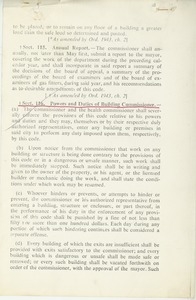University of Massachusetts Amherst Libraries Special Collections and University Archives
Elmer C. Bartels Papers, 1961-2014
As the Commissioner of the Massachusetts Rehabilitation Commission for thirty years, Elmer C. Bartels became a national leader on issues related to vocational rehabilitation and independent living for people with disabilities. While studying physics at Colby College in 1960, Bartels broke his neck in an inter-fraternity hockey game, but returned to complete his degree and then to earn an MS at Tufts. While working as a computer programmer at the Laboratory for Nuclear Science at MIT and later at Honeywell, he became involved in coordinating services and access that members of the community needed to survive. To address the range of issues relating to employment, housing, and architectural barriers for people with disabilities, he helped found three significant organizations: the Massachusetts Association of Paraplegiacs (1964), the Massachusetts Council of Organizations of the Handicapped (a cross-disability organization created in the late 1960s with Harold Remmes) and the Boston Center for Independent Living (1972). Bartels was a key figure in securing passage of the Rehabilitation Act of 1973, considered the first civil-rights statute for persons with disabilities. In 1977, Bartels was appointed to the Massachusetts Rehabilitation Commission by Gov. Michael Dukakis, serving under seven successive administrations, leaving an important mark on public policy. Since leaving the MRC, Bartels has remained active as a teacher and advocate for disability issues.The Bartels Papers are an important resource for study of the early history of disability advocacy and public policy in Massachusetts. The collection includes a wealth of material on the formation and activity of the Massachusetts Association of Paraplegiacs, the National Paraplegia Foundation, and the Mass Rehabilitation Commission; correspondence with other leading figures in the disability rights movement; and publications relating to legislation on disability issues, vocational rehabilitation, and independent living.
